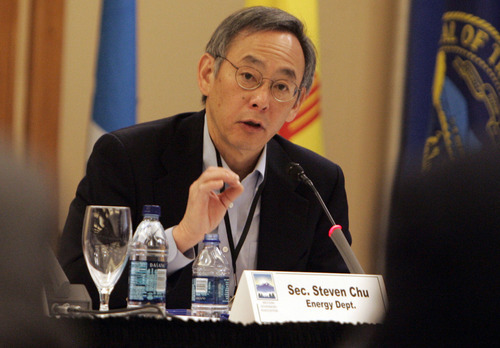This is an archived article that was published on sltrib.com in 2011, and information in the article may be outdated. It is provided only for personal research purposes and may not be reprinted.
In Utah and across the country, families and businesses are feeling the impact of rising gas prices. At the same time, the United States is spending about $1 billion a day to import oil — money which we should be investing in American energy and American jobs.
In the coming decades, the price of oil will rise, driven by growing demand from developing countries. In the past, America's policy has been to hit the panic button when prices go up and the snooze button when they go back down. This is not a sustainable solution for our economy or our security.
President Obama is committed to easing the burden of gas prices for Utah's families and to putting America back in control of our energy future. As he works to do what he can to ease the immediate pain, he has a long-term plan to reduce oil imports by one-third in a little more than a decade. Instead of relying on others, we'll rely on America's vast clean energy resources and unrivaled leadership in technological innovation. Our "all of the above" approach includes increasing domestic production, diversifying our transportation energy choices, and developing more efficient vehicles that will save you money.
For example, we secured an agreement from all the major auto companies to raise the fuel economy of passenger cars and trucks. As a result, new cars will get better gas mileage that will save a typical driver about $3,000. The administration's investments in electric vehicles, advanced biofuels, high-speed rail and public transportation are giving consumers more choices in the vehicles they drive and how they get from place to place.
But lasting change must happen city by city and state by state. That is why the Department of Energy's Clean Cities program is working with state and municipal governments, small businesses, schools, community organizations, and others to reduce the amount of gasoline used to power our vehicles.
As one of the leaders of the Clean Cities program, Utah is already working to transition its transportation fleets to more fuel-efficient, alternative vehicles. By partnering with the federal government, local businesses, fleet owners, non-profits and others, the Utah Clean Cities Coalition saved more than 23 million gallons of gasoline from 2005 to 2009.
Leveraging a Department of Energy grant, the Utah Clean Cities Coalition established a statewide program to provide idle-reduction training to every school bus driver in the state. After training 3,000 drivers in all 41 school districts, the state government passed a law integrating the idle-reduction workshop into the required school bus driver in-service training. With the average driver reducing idling by 21 minutes a day, the coalition estimates that the training saves more than 92,000 gallons of diesel fuel a year.
With support from a Clean Cities grant, Utah opened its first liquefied natural gas station in March. Located at the Flying J Travel Plaza, the station adds to the expanding LNG corridor between Utah and Nevada. Serving every type of vehicle, from light-duty to Class 8 and triple-trailer trucks, the gas station will increase the area's access to cleaner, cost-saving fuels.
Since its launch 18 years ago, the Clean Cities program has helped save nearly 3 billion gallons of gasoline and diesel fuel. By working together through programs like the Clean Cities initiative, we can reduce our dependence on foreign oil and help protect Utah families from pain at the pump.
Steven Chu is the U.S. Department of Energy secretary.



